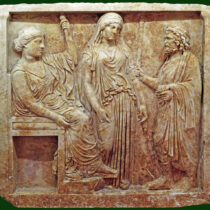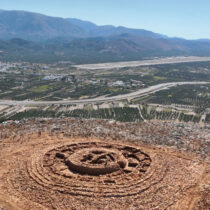The volume (Im)Migrants and Democracies: Ancient and Modern aims to explore perceptions and aspects of (im)migration during the Archaic, Classical, and Hellenistic periods, with a special (but not exclusive) focus on the role democracies played in the lives of (im)migrants and how (im)migrants affected host communities.
Call for Papers
We welcome contributions that examine individuals or groups of peopleexiting and entering communities governed by any form of democratic or participatory constitution within the Greek world and its periphery.
The displacement in question can be either voluntary, forced, individual, or group, such as the sophists, wealthy non-citizens, or ostracised politicians in Classical Athens, the settlers in newly created Messene, citizens of member states moving between communities belonging to federations (Koina), individuals exercising the right of isopoliteia or enktēsis, and so on.
The volume aims at fomenting discussions exploring two main themes: a) how ancient democracies perceived different forms of (im)migration, and b) which similarities, differences, and/or references the ancient world can still suggest to the modern world. Our chief aim is to explore how ancient perceptions of (im)migration by democracies can help us reflect on analogous contemporary phenomena, that is, democracies and (im)migrants.
We expect this volume to be the first part of a bigger project. Our overarching goal is to co-examine ancient and modern (im)migration to highlight strategies and perceptionsof individuals, groups, and political authorities on the topic. A second Call for Papers will gather contributions from scholars aiming to draw comparisons or articulate case studies of similar incidents in the ancient world and more recent eras to frame (im)migration within a long historical context. The two volumes will be published by Isegoria Publishing Open Access, digitally, with a Print-on-Demand option.
Editors
Breno Battistin Sebastiani (University of São Paulo, Brazil)
Zilong Guo (Institute for the History of Ancient Civilizations, Northeast Normal University, Changchun, People’s Republic of China)
Basileus Zeno (Amherst College, Amherst MA, United States)
Scope, Themes, and Topics
We invite authors to define and use terms they best apply to their cases. We are looking for papers examining temporary or permanent displacement, how democratic institutions viewed the phenomenon and treated (im)migrating groups and individuals, and how these newcomers viewed their situation and affected their host communities. Chief issues to be discussed can be summarised (not exclusively) as how ancient forms of democracy and displaced individuals or groups of people viewed the following:
Voluntary and/or forced (im)migration: migrants (metanastai, epaktoi, dēmopoiētoi), wanderers (planētes), seers, poets, sex-workers (pornai, hetairai), doctors, or persecuted individuals for any reason (political, religious, and so on).
Individual and/or group (im)migration: for instance, Athenian metoikoi, the farmers of Attica behind the walls of Athens during the Peloponnesian War, Hellenistic mercenaries and commanders in their host communities.
Economic motivations behind (im)migration, or the several factors associated with push/pull conditions and areas. Contributors may want to examine aspects such as isopoliteia, Xenophon’s 10,000, the Hellenistic kings’ philoi, and others.
Literary descriptions of displaced individuals and communities: the Achaeans at Troy and Nostoi; displaced individuals or groups in tragedy and literary critique.
Indicative research questions and inter-disciplinary approaches are welcome and can appreciate the following (again, not exclusively):
What is it that makes an (im)migrant? Is it just displacement or much more than simple relocation? Perhaps a mindset or several perceptions ascribed to displaced people, or attitudes displaced people wilfully/involuntary subscribe to and take on a specific role, that of the Other or the Not-Exactly-Us-but-Close-Enough?
How can different conceptualisations of (im)migration and democracy help us understand each concept better? How was (im)migration understood and addressed in the past?
How do our sources portray (im)migration and (im)migrants? Do they treat individuals and groups, forced and voluntary, temporary or permanent relocation differently? Are specific categories viewed in a positive or negative light?
Is there a dividing line between mobility and (im)migration? How colonisation or trade, for instance, can be conceived as pertaining to the (im)migratory phenomenon?
What kind of stories and frameworks were formulated to interpret (im)migration? Foundation myths, conflict, fate, famine, the gods, the kings, profit, and other factors could be viewed as reasons, but were there any underlying stories behind banishment or expulsion (e.g., ostracism as the catalyst of political reforms in Classical Athens)? How would the ‘victims’ put it, how would the perpetrators, ancient authors, and the communities where the displaced made their new homes?
Information for Prospective Contributors
For reasons of wider dissemination and accessibility:
We particularly welcome contributions from colleagues based outside Europe and North America, as we aim at capturing views from different parts of the world.
We prioritise contributions from colleagues belonging to groups currently under-represented in Classical Studies.
English as the language of publication. Because we value all languages and academic backgrounds, the final publication of the essays will also contain a long abstract in the authors’ preferred language. Our publisher, Isegoria Publishing, will provide support to non-Anglophone colleagues and the selection criterion would be substance, not style or surface.
If you are interested in this project, please submit an abstract in English (c. 1,000-1,500 words), along with a short list of references (5-10, which do not count towards the word limit). The deadline for submission is July 17, 2022, and authors will be notified by August 15. Contributors will have four months to submit their manuscript (December 15, 2022) for external review. Authors can expect their manuscript back by March 18, 2023, and will have one month for final refinements and submission.
Submission of Abstract: July 17, 2022
Decision: August 15, 2022
Paper Submission: December 15, 2022
External Peer Review: March 18, 2023
Revised/Final Submission: April 17, 2023
Production: May 2023
The editors and publishers look forward to receiving proposals at [email protected] by July 17. We wish you all the best and let us hope 2022 will be the last Year of the Virus. Stay safe.
Further information: https://isegoriapublishing.co.uk/ancient-immigrants-cfp





